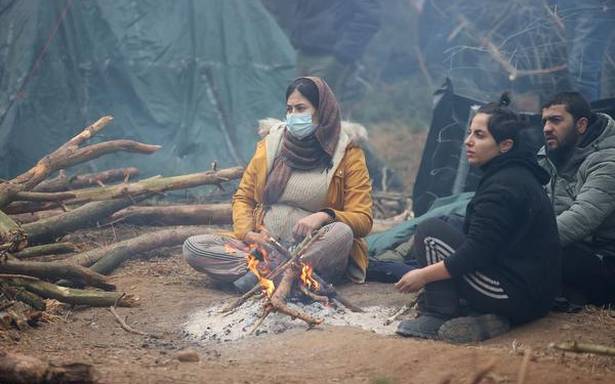The Story So Far
There has been a sudden surge of migrants, including women and children, at the Belarus-Poland border, causing tensions to rise between the two countries. The migrants, estimated to be 2,000-4,000 in number, and mostly from West Asia, including Afghanistan, Iraq and Syria, have made several attempts to cross over into Poland with the aim of seeking asylum in a European Union (EU) country. According to media reports, they were aided in their efforts by Belarusian border guards.
THE GIST
- A sudden surge of migrants, including women and children, at the Belarus-Poland border, are causing tensions between the two countries.
- Poland and Lithuania, both of which have been at the receiving end of the migrant surge, allege that the whole crisis was orchestrated by Belarusian President Alexander Lukashenko.
- Poland has tightened its border security, amassing 15,000 troops and creating a two-mile-deep buffer zone to prevent unauthorised border crossings.
How did the migrants end up at the Polish border?
According to Belarus’s two European neighbours, Poland and Lithuania – both of whom have been at the receiving end of the migrants surge — the whole crisis was orchestrated by Belarusian President Alexander Lukashenko. His victory in the 2020 presidential polls, widely perceived as fraudulent, triggered nation-wide protests by pro-democracy activists. Lukashenko unleashed a brutal crackdown, going to the extent of getting a Ryanair flight hijacked by his intelligence agents to detain and jail a dissident journalist. The EU responded to the human rights violations by imposing punitive sanctions on officials and entities linked to the Belarusian regime.
Protesters fleeing repression were also given refuge by Poland, and allowed to carry out anti-Lukashenko propaganda. Poland, therefore, views the migrant surge at its borders as Belarus’s retaliation against the sanctions. It has claimed that Belarus is waging a “hybrid war”, deploying unconventional methods to apply pressure on an adversary. Lithuania, too, has accused Belarus of “weaponising migrants” by luring thousands of them to Minsk from West Asia and then pushing them into the forests along the border with the aim of unleashing chaos in the EU.
In June this year, smarting under the punitive sanctions, Lukashenko had threatened to lift border controls on the movement of migrants, drugs and even nuclear materials. This week’s events are thus being viewed in the EU as Lukashenko carrying out that threat. Belarus, on its part, has stated that the migrants arrived in Belarus legally, and made their way to the Polish border on their own.
How has Poland responded?
Poland is ruled by the right-wing populist Law and Justice party (PiS), which is hostile to immigrants. It has tightened its border security, amassing 15,000 troops and creating a two-mile deep buffer zone to prevent unauthorised border crossings. Those who managed to cross over were pushed back into Belarus by Polish security forces.
The Polish Prime Minister Mateusz Morawiecki said in Parliament that the situation at the border was the effect of Russia’s efforts to destabilise a region it had controlled during the Cold War era. At the same time, the PiS has also extracted political mileage from the crisis. The party had seen its popularity dip in recent months after a tough new anti-abortion regulation came into force earlier this year following a court ruling. The near-total ban on abortion advocated by the PiS was blamed for the death of a woman who died due to a delay in administering abortion. With the Opposition seeking to pin down the government over this issue, the migrant crisis at the border has been a godsend for the PIS. With the centrist Opposition parties taking a more humanitarian approach towards the migrants, the PIS and the state-controlled media have tried to paint the Opposition as ‘traitors’ who are on the same side as the migrants and Lukashenko. From being on the offensive, Polish Opposition leaders – including those critical of the PIS’s anti-immigrant stance – have turned increasingly cautious as they seek to avoid the trap of getting projected as being sympathetic to Lukashenko.
What are the geo-political ramifications?
In a response to Poland’s troop build-up along its border with Belarus, Russia on Wednesday dispatched two strategic, long-range Tu-22M3 bombers to patrol the border region. This is seen as a signal to the EU that Belarus enjoys the full backing of the Russian military, and that the surge in Polish troops – the largest such build-up since the end of the Cold War — is being viewed as a hostile move.
Russia has also squarely blamed the EU for the migrant crisis, arguing that it was EU’s refusal to accept asylum-seekers that is creating the crisis. German Chancellor Angela Merkel has reportedly spoken over phone with Russian President Vladimir Putin on the issue. Russia has taken the position that EU should take up the matter directly with Lukashenko.
The Belausian strongman, however, has struck a defiant note. Speaking on state television, he alleged that it was the EU that was waging a “hybrid war” by imposing sanctions against Belarus. He also accused Poland of engaging in “provocations” by flying military helicopters low over the border to scare away migrants.
What next?
With the EU set to impose further sanctions on Belarus, Poland determined to keep the migrants out, Belarus unwilling to take measures to aid the migrants camping out in the forests without food or water, and winter closing in, the fate of thousands of migrants remains dire.
Source: Read Full Article

